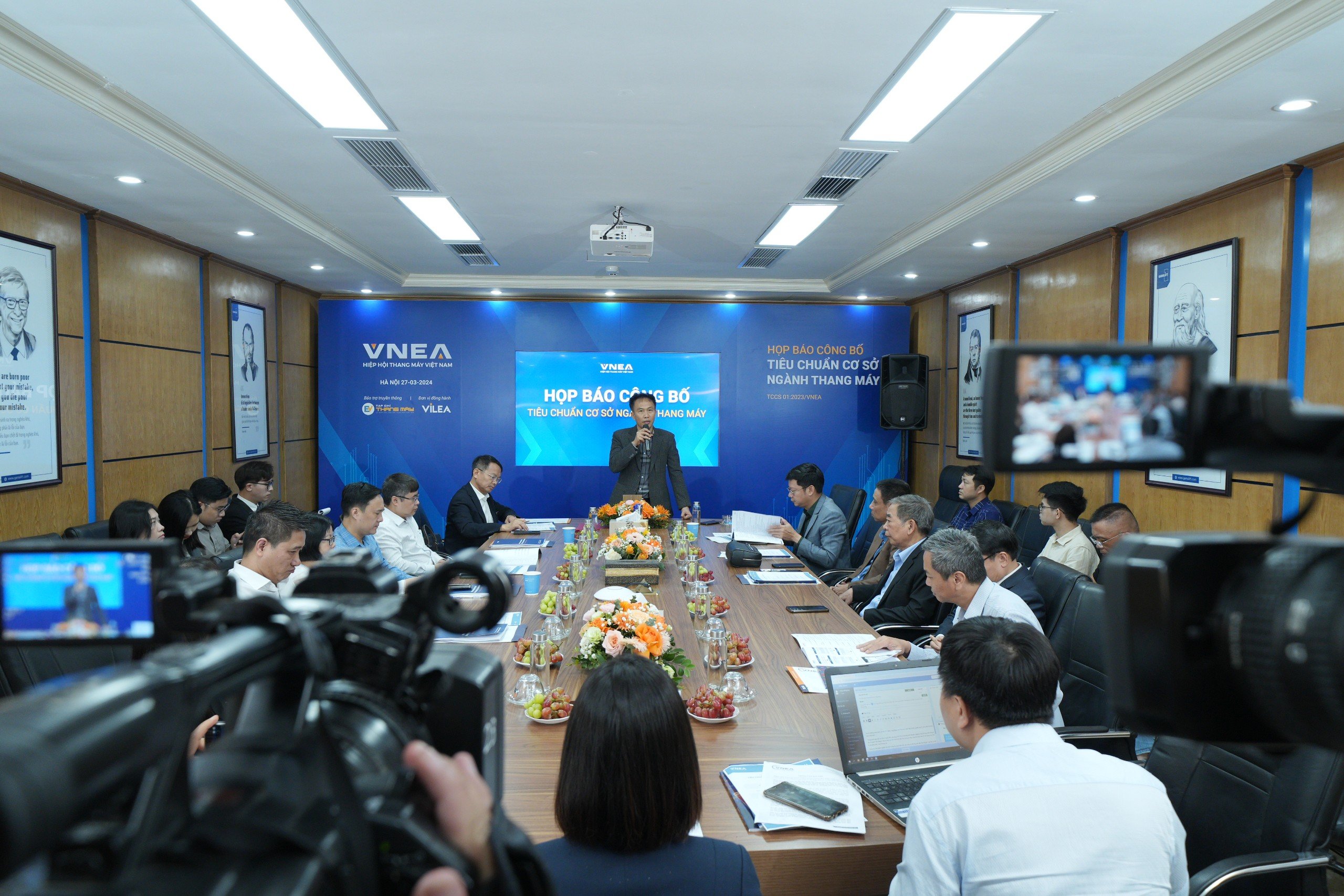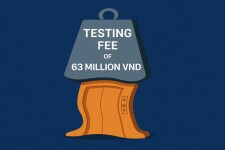EM – On the morning of March 27, 2024, in Hanoi, the Vietnam Elevator Association officially announced the first Base Standard of the Elevator Industry. This standard establishes the fundamental safety requirements, use, maintenance, and repair of elevators.
At the announcement ceremony, Mr. Nguyen Hai Duc, Chairman of the Vietnam Elevator Association, stated that the Base Standard (TCCS) is the result of thorough research conducted by the Vietnam Institute of Lift Engineering Application, using the elevator as the core, with elevator users as the center, while considering industry standards. At the same time, the TCCS aims to address the concerns of all stakeholders involved in ensuring elevator safety: owners, elevator users, government regulatory agencies, industry professionals, and society as a whole.

Mr. Nguyen Hai Duc, Chairman of the Vietnam Elevator Association, makes a statement at the Press Conference on the Announcement of the Elevator Industry Base Standard (TCCS)
In explaining the content of the Elevator Industry Base Standard (TCCS), Mr. Nguyen Huy Tien, Secretary-General of the Vietnam Elevator Association, highlighted that the current technical regulations (QCVN) and national standards (TCVN) for elevators primarily focus on safety requirements related to design and installation – the pre-operation phase of elevators. This phase is crucial, as the standards ensure the provision of safe and appropriate elevators to users, aligned with the industry’s development stages.
However, according to Mr. Nguyen Huy Tien, “We either do not have, or don’t have enough requirements for safety in elevator usage, maintenance, and repair.” He emphasized the need to establish industry standards based on these requirements to provide a foundation for elevator-related activities involving users, businesses, government regulatory agencies, and others involved in the elevator industry.

Mr. Nguyen Huy Tien, Secretary-General of the Vietnam Elevator Association, presents a summary of the content of the Elevator Industry Base Standard (TCCS) titled “General Safety Requirements in the Management, Use, Maintenance, and Repair of Elevators”
Therefore, the Vietnam Elevator Association has taken the lead in planning, strategizing, and conducting a checking, delegating the draft to the Vietnam Institute of Lift Engineering Application for the development of the Elevator Industry Base Standard.
After the drafting process and gathering feedback to date from relevant individuals and organizations such as businesses, consumers, experts from relevant agencies, and government regulatory agencies the first Elevator Industry Base Standard, TCCS 01:2023/VNEA, titled “General Safety Requirements in the Management, Use, Maintenance, and Repair of Elevators,” has been completed and officially announced.

The base standard builds upon the existing national standard (TCVN), with necessary enhancements and adjustments to align with the cultural context and technological development capabilities within the country. The Elevator Industry Base Standard (TCCS) not only focuses on safety requirements during the manufacturing and installation phases but also addresses the usage, operational organization, maintenance, and repair processes. This comprehensive approach aims to address the specific concerns of businesses, contributing to their improvement and enhancing their competitive abilities in line with societal trends and requirements.
The Elevator Industry Base Standard (TCCS) establishes standards and requirements for the necessary tasks to ensure safe and durable elevator operation. It encompasses four main content areas:
1. Detailed work tasks for elevator technical services, including regular technical inspections, maintenance, emergency rescue, routine repairs, major repairs, elevator modernization, etc.
2. Requirements for elevator owners and users to ensure operational conditions, compliance with regulations, and the necessary actions to be taken during elevator usage and emergency situations.
3. Requirements for specialized entities in terms of infrastructure, technical equipment, organizational structure, workforce planning, and staffing levels to meet the workload demands.
4. Requirements for the technical competence of elevator personnel, ranging from technical staff (operation, maintenance) to organizational and managerial experts.
In addition, the TCCS is also the first official document in Vietnam that focuses on the recommended equipment lifespan – an important aspect of elevator operation based on research, evaluation, and specific synthesis.
The TCCS can serve as an important and useful basis for elevator owners and government regulatory agencies for budgeting and pricing for maintenance, repairs, as well as organizing the management and operation of elevators correctly.
It also serves as a foundation for manufacturers and elevator service companies to create relevant documentation and operating guidelines, as well as to plan their production and business activities.
Within the content of TCCS 01:2023/VNEA, the identification code system for elevators is introduced by the Vietnam Elevator Association in terms of form and practicality. Through the ID code and QR code lookup system, the elevator identification code helps enhance transparency regarding the elevator’s condition and improves effectiveness in management, repair, rescue operations, etc., for consumers, businesses, and government regulatory agencies.
 Mrs. Nguyen Thi Tu Linh – Secretary of the Vietnamese Elevator Association introduces the project Elevator Identification Code and Technical Certification
Mrs. Nguyen Thi Tu Linh – Secretary of the Vietnamese Elevator Association introduces the project Elevator Identification Code and Technical Certification
Moving forward, the Vietnamese Elevator Association will continue its activities to apply the Elevator Industry Base Standard (TCCS) in the practical aspects of the elevator industry. These initiatives will target relevant groups, including training, guidance, and the development of monitoring and management tools and systems.

The representatives participating in the Press Conference announcing the Elevator Industry Base Standard (TCCS)





